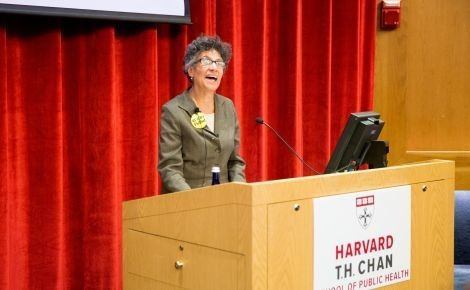November 3, 2015 — Public health professionals must not be afraid to use the word “racism” when they see health inequities linked to issues like poverty, segregation, and lack of access to care, Mary Travis Bassett, commissioner of the New York City Department of Health and Mental Hygiene, told an audience at Harvard T.H. Chan School of Public Health on October 26, 2015.
“If we fail to explicitly talk about racism in health, especially at this time of public dialogue about race relations in this country, we may unintentionally bolster the status quo and enable the perpetuation of health inequities even as society is calling for change,” Bassett said.
Acting Dean David Hunter introduced Bassett as a “champion of public health” who has spent over three decades advancing health equity in locations ranging from Roxbury, MA, and Harlem, NY, to Zimbabwe. Bassett said she chose “#BlackLivesMatter — A Challenge to the Medical and Public Health Communities” as the title of both her Dean’s Distinguished Lecture and a New England Journal of Medicine paper she wrote earlier this year to raise awareness of how racism can negatively impact health. Over the years she has collaborated with Nancy Krieger, professor of social epidemiology, on a book chapter and other initiatives on social injustice topics.
The #BlackLivesMatter movement, launched in 2012 following the death of Trayvon Martin in Florida, has grown in scope recently following the highly publicized deaths of black men at the hands of white police. The movement has expanded to reflect broader issues, including “all the ways that black people are deprived of basic human rights and dignity,” Bassett said. These inequities especially impact vulnerable members of the black population, including women and girls, the disabled, those who are undocumented, transgender, or have police records. “The average life expectancy of black transgender women is only 35 years, which is really shocking,” she said, citing a #Black Lives Matter organization statistic.
Public health professionals can help by gathering data and conducting research to document the inequities, Bassett said. In New York City, which she described as the fifth most segregated U.S. city, a survey found 11% of city residents (or about 1 in 6 in some neighborhoods) reported not getting needed medical care between 2011-13. The New York City health department also provided data that led to a series of maps showing worse health outcomes in poor neighborhoods compared with that of wealthier communities. Researchers analyzing the data found higher incidence of HIV/AIDS, asthma, and diabetes and more drug hospitalizations in poorer neighborhoods. They also found lifespans in those neighborhoods were up to 11 years shorter compared with wealthier neighborhoods. Sometimes those neighborhoods were only a few subway stops apart, she added.
“Our passion is driven by the data,” she said. “It’s time to change the narrative and acknowledge these enduring differences have to be changed.”
– Marge Dwyer
photo: Emily Cuccarese
